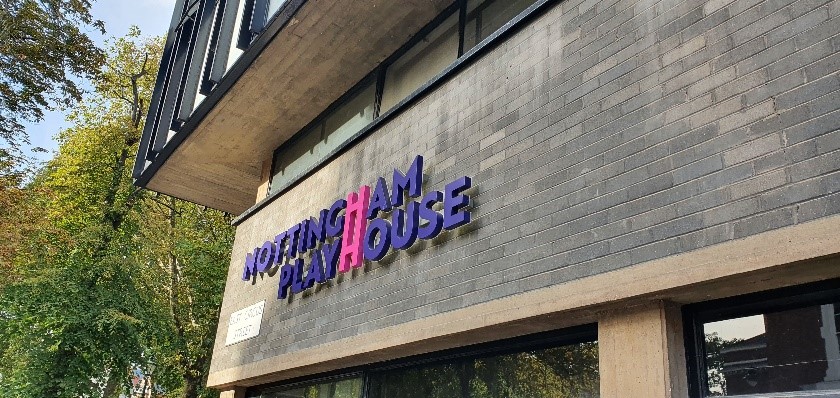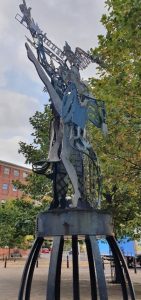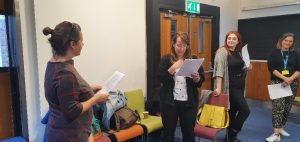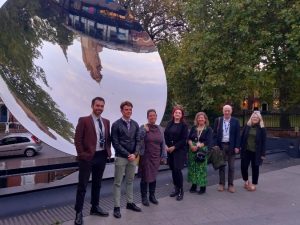
October 25, 2022, by Rupert Knight
Playing with possibilities at the Nottingham Playhouse
On Thursday 11th October, Aisling Walters (Secondary English PGCE course lead at NTU) and Helen Victoria Smith (Primary PGCE Course Leader at UoN) joined some PGCE students and tutors to spend a fun-filled two hours at the Nottingham Playhouse. This marked the first in a series of enrichment events taking place across the city for beginning teachers from Nottingham Trent University and the University of Nottingham (as part of the ‘Universities for Nottingham’ initiative).
The programme
In partnership with ChalleNGe (Nottingham’s Cultural Education Partnership), events like this one will be taking place across this academic year, aiming to give our fledging teachers:
• a deep understanding of how they can support young people to feel connected to and valued by their community;
• a robust knowledge of placed-based approaches to education which connect learning and communities with the primary goals of increasing pupil engagement and boosting academic outcomes;
• an understanding of the many creative and arts opportunities for young people and schools in the local region;
• an additional depth of knowledge that they will be able to offer to employing schools.
Powerful play

After talking through the many ways that the Playhouse engages with local schools, our lively hosts, Martin Berry and Lloydie James Lloyd, introduced the idea of improvisation. As someone who is old enough to remember the series ‘Whose Line Is It Anyway?’, where incredibly talented performers like John Sessions and Josie Lawrence had to react to random ideas from the audience to create weird and wonderful sketches, Helen felt her anxiety levels rapidly rising. Surely, she would be rubbish and end up looking a fool? Aisling started trying to ‘plan’ answers in advance, worried about making a mistake.
However, Lloydie explained that improvisation can be a powerful tool in the classroom, supporting active listening and responding, giving pupils opportunities to build ideas together in ways they could do not do on their own, giving pupils agency to make their own choices, developing skills that can be transferred to other areas of learning and life, and giving pupils permission to make mistakes. Aisling and Helen were curious (and stopped looking for an escape route!).
What we discovered was that improvising was about being playful – playing with words, playing different roles and, like all good games, having fun. One activity that will stay with Helen was where we had to come up with 3 ideas that were related in some way with no warning. Standing in a circle, one person began the game by walking towards someone else saying their 3 ideas (e.g., umbrella, raincoat, wellies). The person they walked to then had to do the same thing but starting with the last idea they had heard (e.g., wellies, puddle, mud). When it was Helen’s turn, the pressure was too much, and her mind went blank. Although she had failed, she was given an opportunity to start the game off again and was successful that time. Pondering on how this might feel for a pupil in a classroom, Helen reflected that being given permission to ‘fail’ in this low-stakes activity, followed by another opportunity to be successful, had felt liberating, empowering, and inclusive.
The game then evolved to become more creative and collaborative. This time, one person stepped into the circle and shared just one idea, e.g. “I am a knife”. Anyone could then step forward and say another idea that they thought connected to the first, e.g. “I am a fork”, then a third person would do the same, e.g. “I am a spoon”. The first person had the responsibility of choosing either the second or third person to be the first one in the next round and they would start by repeating their idea. Playing this game felt less daunting as we were not compelled to contribute and only had to think of one idea at a time, prompting us to reflect on how teachers can allow pupils’ agency and ways to develop their creative thinking. One interesting string of ideas was “I am a word, I am music, I am Madonna”. Sadly, that game ended there – in what direction might it have gone next?
Through engaging in these and other games that involved interacting in different ways with different people, not only did we start to feel more comfortable, we also came to realise that improvisation is a powerful teaching tool for primary and secondary teachers looking to develop young people’s creative thinking, storytelling, use of spoken language, knowledge of each other, sense of community, collaborative skills, and engagement.
Finding our voice

The final part of the session involved exploring how teachers can make the best use of their voices, both literally and metaphorically. As the Universities for Nottingham programme aims to support trainee teachers’ autonomy and their well-being, Martin’s guidance about how best to look after our voice was particularly pertinent at the end of a busy half term! Through a series of activities, we learned about breathing, articulation, and relaxation. Laughing a lot, we kissed (the air), hurled Shakespearean insults at each other, tripped up over tongue twisters, held our breath, and tried to relax!
What’s next?

We have events happening across the year at Nottingham Contemporary, Lakeside Arts, New Art Exchange, Nottingham Castle, Wollaton Hall and the National Justice Museum. If you are a beginning teacher at either NTU or UoN and would like to know how you can be kept informed about these future events, join in the fun, and become a ‘Cultural Rucksack Champion’, please contact:
Stefanie.Sullivan@nottingham.ac.uk, Katie.Willshire@ntu.ac.uk or Aisling.Walters@ntu.ac.uk
No comments yet, fill out a comment to be the first

Leave a Reply